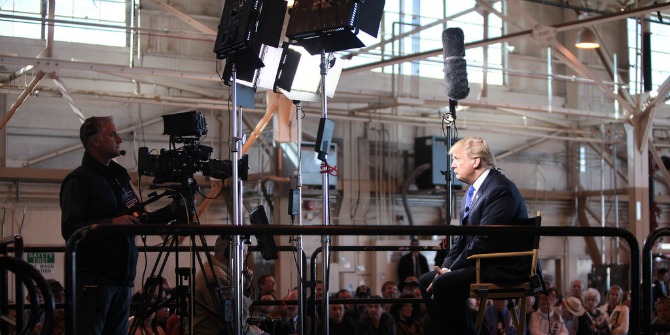 Last week, President Trump was diagnosed with COVID-19 and later hospitalized. In this Q&A, Julie Norman argues that while Trump’s diagnosis is sure to change the way both candidates’ campaign from now until Election Day, it is only likely to entrench voters’ existing views about the presidential contenders.
Last week, President Trump was diagnosed with COVID-19 and later hospitalized. In this Q&A, Julie Norman argues that while Trump’s diagnosis is sure to change the way both candidates’ campaign from now until Election Day, it is only likely to entrench voters’ existing views about the presidential contenders.
What does Trump’s diagnosis mean for the campaigns?
Trump’s diagnosis will alter the shape, the pace, and even the tone of the campaigns in this crucial last month when both candidates are typically working aggressively to get out the vote and woo undecideds. The Trump campaign has had to cancel or postpone a series of in-person rallies and events in which the President typically thrives, at most promising to send surrogates such as Vice President Mike Pence or Trump’s sons. The Biden campaign, though relying more on virtual events already due to COVID-19 concerns, has cancelled at least one in-person event, and has also dropped negative ads aimed against the President, trying to balance maintaining momentum while not exploiting Trump’s health situation. The format and timing of the remaining debates, planned for 15 and 22 October, are also in question.
Will the news change the election?
The news may change the candidates’’ campaigns, but it won’t change many voters’ minds. Rather, it will entrench them. The diagnosis will most likely invoke a ‘rally around the leader’ effect for his supporters; assuming Trump recovers fully, most are likely to embrace the White House’s framing of Trump as a ‘warrior’ coming through the other side of the virus. Meanwhile, most Democrats will see the news as underscoring Trump’s mishandling of the virus and stressing the need to have a leader in the White House who takes the pandemic seriously. Democrats may also view the President’s experience as emphasising the need for better health care for the millions of Americans who could not access even a fraction of the care that Trump has (rightfully) received during his own illness.
How will the news affect views of the pandemic?
Trump’s diagnosis has put the pandemic squarely back in the forefront of the election, overshadowing other recent stories like the tax returns, Supreme Court nomination, and protests for racial justice. Despite a range of crises, the pandemic has been the crucial issue this year, so it is not surprising that it is shaping the end of the race. Trump’s diagnosis undermines his own messaging on the virus, from downplaying its gravity to dismissing precautionary measures such as wearing masks and social distancing. A potential silver lining from his diagnosis may be if it moderates some of the hyper-partisanship and polarisation around the pandemic in the United States, especially if Trump adopts a more pragmatic message upon recovery, and if the White House adopts different optics around precautionary measures.
How is the news affecting other issues?
With several Senate members already testing positive, and multiple cases tracing back to Amy Coney Barrett’s nomination ceremony on 26 September, it is likely that the Senate confirmation process to fill Ruth Bader Ginsburg’s Supreme Court seat will face at least some delays. Senate Majority Leader Mitch McConnell has already postponed Senate floor activity until 19 October as the virus spreads, but he reiterated that the confirmation process was still moving forward as planned. However, several Senators testing positive are members of the Judiciary Committee (which must first approve the nominee ahead of a full Senate vote), so the timeline may depend on the extent to which the virus continues to spread through the high levels of government. The news will also put further pressure on Congress to pass a fiscal stimulus bill this week, partly in response to markets falling around the uncertainty of the President’s health on Friday, and with the pandemic back in the forefront in Washington and around the country.
- Featured image: ‘Rally for Trump outside Walter Reed‘ by Blink O’fanaye is licensed under CC BY NC 2.0
Please read our comments policy before commenting.
Note: This article gives the views of the author, and not the position of USAPP– American Politics and Policy, nor of the London School of Economics.
Shortened URL for this post: https://bit.ly/2F6VVc3
About the author
 Julie Norman – University College London (UCL)
Julie Norman – University College London (UCL)
Dr Julie Norman (@DrJulieNorman2) is a Senior Teaching Fellow in the Department of Political Science at University College London (UCL), and a researcher at UCL’s Centre for US Politics (@CUSP_ucl).






